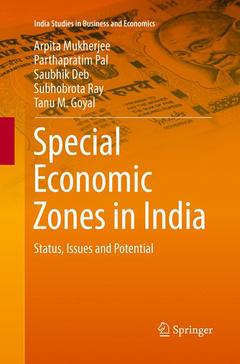Description
Special Economic Zones in India, Softcover reprint of the original 1st ed. 2016
Status, Issues and Potential
India Studies in Business and Economics Series
Authors: Mukherjee Arpita, Pal Parthapratim, Deb Saubhik, Ray Subhobrota, Goyal Tanu M
Language: English
Subjects for Special Economic Zones in India:
137.14 €
In Print (Delivery period: 15 days).
Add to cartPublication date: 05-2018
Support: Print on demand
137.14 €
In Print (Delivery period: 15 days).
Add to cartPublication date: 07-2016
Support: Print on demand
Description
/li>Contents
/li>Biography
/li>Comment
/li>
Evaluates India’s Special Economic Zones (SEZs) policy in the context of trade and globalisation
Critically analyses the business environment in SEZs and offers policy recommendations on how to improve it
Examines India’s experiences with SEZs and provides inputs on how to make SEZs successful so that they can contribute to India’s growth and development
Includes supplementary material: sn.pub/extras




